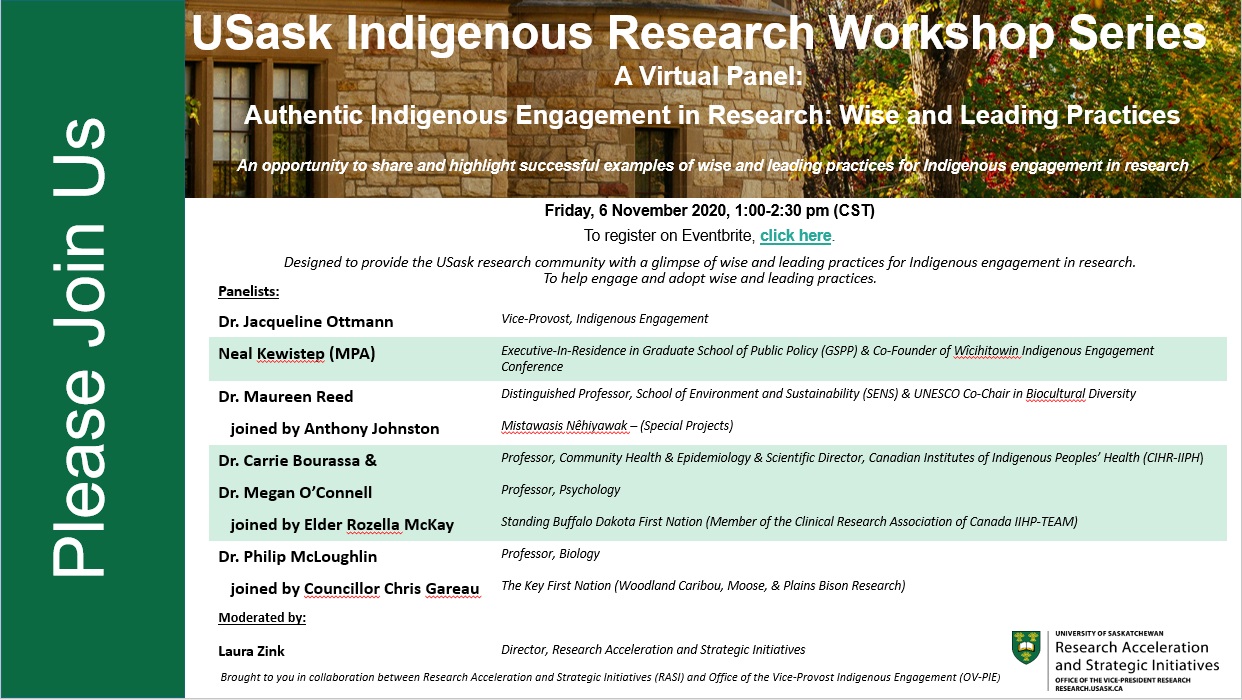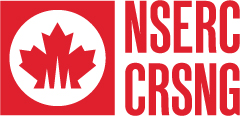Overview
We facilitate, promote, and support Indigenous research and scholarship through:
- Grant facilitation of large-scale and strategic applications supporting multi-partner research projects promoting Indigenous scholarship and/or engaging Indigenous community partners.
- Elevating the profile of Indigenous Faculty by promoting and supporting the development of key submissions to special calls for national research leadership.
- Strengthening and identifying existing resources for university researchers to promote and engage in collaborative and culturally responsive research with Indigenous communities and stakeholders.
USask Indigenous Research Workshop Series
USask Indigenous Research Workshop Series
Dimensions of Ethical Principles in Indigenous Research
Workshop Series Description
This workshop series is designed to inform the broader USask community about the shifting landscape of Indigenous scholarship and provide broad insights on wise and leading practices for embarking on equitable research “with and by” Indigenous communities. The workshop series is a collaborative effort between USask’s Research Acceleration and Strategic Initiatives (RASI), Office of the Vice Provost Indigenous Engagement (OVPIE), Research Ethics, Finance, and ConnectionPoint.
Panel Overview
This current workshop, organized as panel discussion, will describe ethical principles of Indigenous research. The panelists will provide insights through their roles within and working with the Research Ethics Board (REB). Together, the panelists recognize Indigenous research approaches will vary based on many factors. However, they also recognize that the level of action, commitment, and respect for Indigenous community partners must be central to any research program.
USask Panelists:
Dr. Holly Graham, RN, BA, BScN, MN, PhD, R.D., Psychologist
Indigenous Research Chair in Nursing, Associate Professor, College of Nursing
Dr. Malcolm King, PhD, FCAHS
Scientific Director of the Saskatchewan Centre for Patient-Oriented Research; Professor, Community Health and Epidemiology, College of Medicine
Dr. Robert Henry, PhD
Assistant Professor, Indigenous Studies, College of Arts and Science
Dr. Gordon McKay, PhD
Professor Emeritus and Chair, Biomedical Research Ethics Board
Thank you for your interest in our workshop. We made the decision to postpone this event, as we seek to be sensitive and responsive to the voices of members of our community. Our intention is to reschedule the workshop in the near future.
USask Protocols and Process: Engaging with Indigenous Elders and Participants
This workshop was developed to inform researchers and help them navigate the practical logistics of working with Elders and Knowledge Keepers within the requirements of USask policy and in compliance with ethics:
- Cultural Protocols and Stewardship
- Payment Processes
- Ethical Considerations
Authentic Indigenous Engagement in Research: Wise and Leading Practices
This workshop was designed to provide the USask research community with a glimpse of Indigenous engagement on wise and leading practices in research and how to adopt these practices.
Workshop and discussion was led by the Office of the Vice-Provost Indigenous Engagement, Wîcihitowin, and our USask Research Faculty with their Indigenous community partners to discuss their experiences in Indigenous research.

USask Resources and Information
Indigenous Research Definitions

Research in any field or discipline that is conducted by, grounded in or engaged with First Nations, Inuit, Métis or other Indigenous nations, communities, societies or individuals, and their wisdom, cultures, experiences or knowledge systems, as expressed in their dynamic forms, past and present. Indigenous research can embrace the intellectual, physical, emotional and/or spiritual dimensions of knowledge in creative and interconnected relationships with people, places and the natural environment.
Whatever the methodologies or perspectives that apply in a given context, researchers who conduct Indigenous research, whether they are Indigenous or non-Indigenous themselves, commit to respectful relationships with all Indigenous peoples and communities.
This understanding of Indigenous research reaffirms SSHRC’s support of research by and with Indigenous peoples. Research by and with Indigenous peoples and communities emphasizes and values their existing strengths, assets and knowledge systems.
All research involving Indigenous peoples must be undertaken in accordance with the second edition of the Tri-Council Policy Statement: Ethical Conduct for Research Involving Humans, and, in particular, Chapter 9: Research Involving the First Nations, Inuit and Métis Peoples of Canada.

Indigenous Health Research (IHR) can be defined by any field or discipline related to health and/or wellness that is conducted by, grounded in, or engaged with, First Nations, Inuit or Métis communities, societies or individuals and their wisdom, cultures, experiences or knowledge systems, as expressed in their dynamic forms, past and present.
Indigenous health and wellness research embraces the intellectual, physical, emotional and/or spiritual dimensions of knowledge in creative and interconnected relationships with people, places and the natural environment. Such research is based on the right to respectful engagement and equitable opportunities; it honours culture, language, history, and traditions.
Indigenous health and wellness research, thus defined, may be implemented and adapted in research involving Indigenous Peoples around the world. Whatever the methodologies or perspectives that apply in a given context, researchers who conduct Indigenous research, whether they are Indigenous or non-Indigenous themselves, commit to respectful relationships with Indigenous Peoples and communities.
Wise and Leading Practices

SSHRC is committed to supporting and promoting social sciences and humanities research by and with Indigenous peoples, including First Nations, Métis and Inuit peoples. This commitment is a fundamental part of SSHRC’s mandate, approach and efforts.
As an integral part of this commitment, SSHRC works to support the advancement of Indigenous researchers, including Indigenous graduate students and Indigenous postdoctoral researchers working in the social sciences and humanities.

If applicable, the proposed research program should include Indigenous research components and Indigenous ways of knowing to extend research knowledge in the field that is significant to First Nations, Inuit and Métis peoples and communities. This research must be co-created and co-led with Indigenous Peoples, as leaders, investigators, trainees, partners and collaborators, using a distinction-based approach. It is expected that institutions will support nominees in integrating Indigenous research into their program. A rationale must be provided in cases where the application considers that no aspect of the research may benefit from the inclusion of Indigenous research components.
Refer to the following for additional information: SSHRC’s Indigenous Research Statement of Principles and Guidelines for the Merit Review of Indigenous Research should be used as a reference by institutions when preparing applications that include Indigenous research components.
Ethics
Where the research is likely to affect the welfare of an Indigenous community, or communities, to which prospective participants belong, researchers shall seek engagement with the relevant community. The conditions under which engagement is required include, but are not limited to:
research conducted on First Nations, Inuit or Métis lands;
recruitment criteria that include Indigenous identity as a factor for the entire study or for a subgroup in the study;
research that seeks input from participants regarding a community’s cultural heritage, artefacts, traditional knowledge or unique characteristics;
research in which Indigenous identity or membership in an Indigenous community is used as a variable for the purpose of analysis of the research data; and
interpretation of research results that will refer to Indigenous communities, peoples, language, history or culture.
Equity, Diversity, and Inclusion (EDI)

To learn more about Equity, Diversity, and Inclusion (EDI) considerations at each stage of the research process, please visit the Natural Sciences and Engineering Research Council of Canada (NSERC) website

To learn more about Equity, Diversity, and Inclusion (EDI) best practices in research, please visit the Government of Canada website
Engagement and Partnership Development Funding Opportunities
To learn more about Mitacs Indigenous Pathways grants, please visit their website
Sign-up for our weekly e-newsletter to stay informed of all the upcoming grants, and funding opportunities.
Sign up to our various listservs to be included emails with special funding announcements, please visit our RASI website for more information.
Learning Opportunities
Canadian Institute of Health Research (CIHR) – Webinar
Government of Canada – Tutorial
First Nations Information Governance Centre – Course
Reconciliation Education - Course
University of Saskatchewan (USask), Human Ethics , Education and Training Tab - Course, PowerPoint, Modules, Tutorials
USask, Gwenna Moss Centre for Teaching and Learning - Modules, Courses

